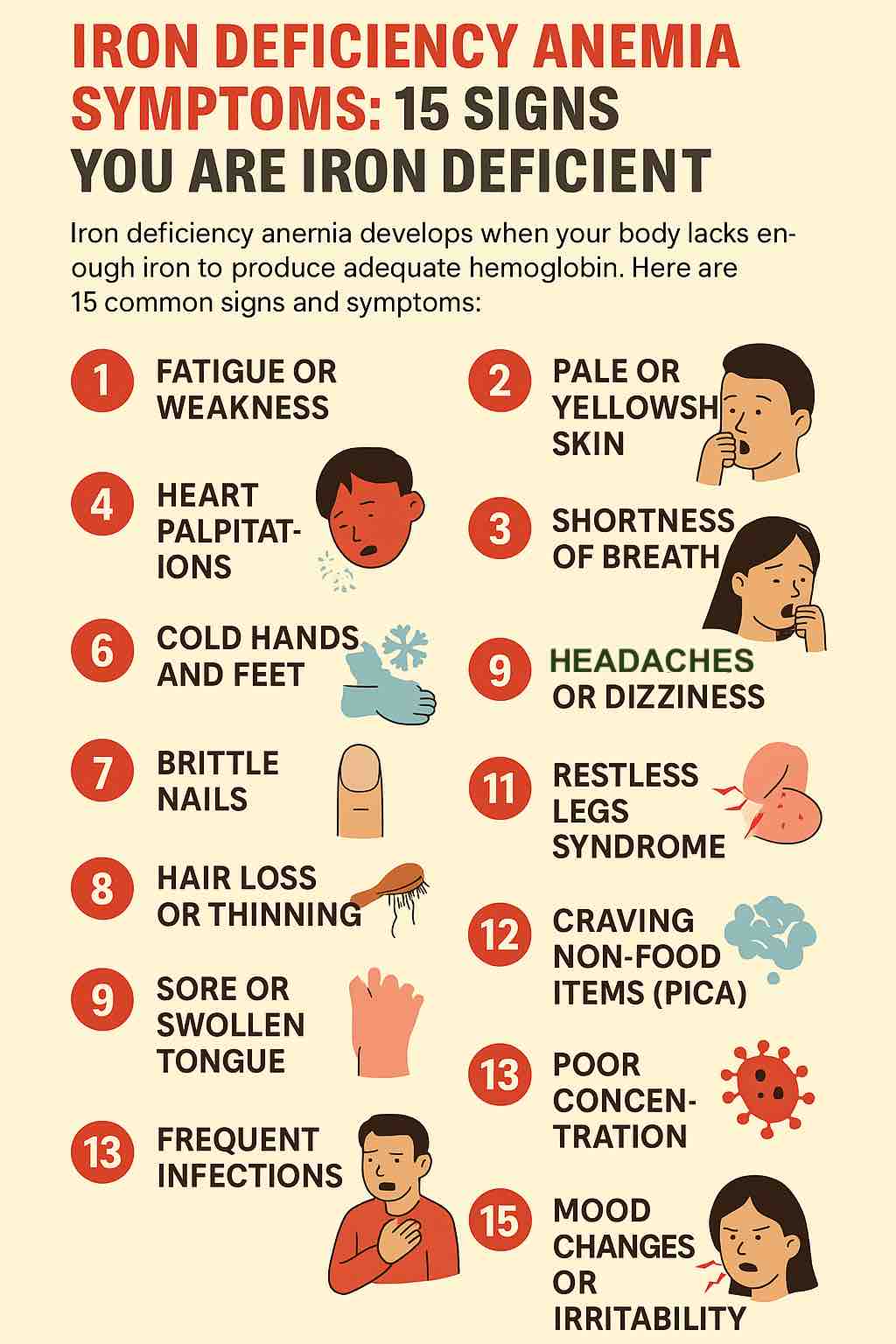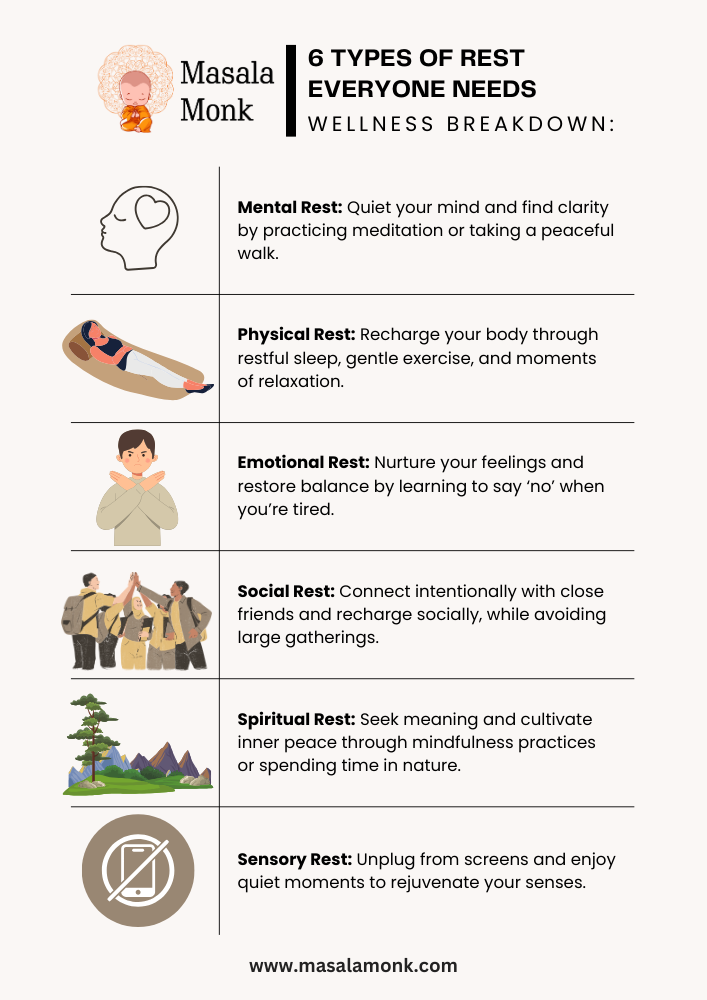
Iron deficiency symptoms are among the most common health complaints worldwide — yet they’re also some of the most overlooked. Iron may be a small trace mineral, but it has a massive role: it helps produce hemoglobin, the protein in red blood cells that delivers oxygen throughout your body. Without enough iron, every cell in your body is deprived of oxygen, and the effects can be felt in your energy, focus, immunity, and even your mood.
At first, low iron symptoms may appear mild — perhaps you feel a bit more tired than usual or notice your nails breaking more easily. But over time, untreated deficiency can lead to Iron Deficiency Anemia (IDA), a condition that affects more than 1.2 billion people worldwide. From unexplained fatigue and hair loss to shortness of breath, chest pain, and brain fog, the signs of anemia can sneak up slowly yet impact nearly every part of daily life.
This guide breaks down the 15 most common iron deficiency symptoms, explores how they can look different in men and women, and shares practical strategies to restore healthy iron levels through diet, supplements, and medical support. If you’ve been wondering whether your tiredness, headaches, or mood changes could be related to low iron, this is your complete evidence-based resource.
🩸 What Is Iron Deficiency Anemia?
Iron Deficiency Anemia (IDA) occurs when your body doesn’t have enough iron to produce adequate hemoglobin — the oxygen-carrying part of red blood cells.
Without sufficient hemoglobin, your body is literally starved of oxygen. The result is a cascade of iron deficiency symptoms that affect everything from your physical energy to your brain function.
Primary Causes of Iron Deficiency Anemia
- Poor dietary intake (especially common in vegetarians and vegans)
- Heavy menstrual bleeding
- Gastrointestinal issues such as ulcers, IBD, or celiac disease
- Pregnancy (higher iron demands)
- Chronic blood loss, including internal bleeding or frequent blood donation
Do Read: Iron Power: Essential Tips for a Healthy Pregnancy
🚨 15 Iron Deficiency Symptoms (Anemia Signs You Shouldn’t Ignore)
Iron deficiency anemia often develops slowly, and its signs can be surprisingly easy to dismiss. At first, you may simply feel a little tired or notice subtle changes in your appearance. However, as iron stores drop further, the symptoms intensify and begin to interfere with daily life. Below are the 15 most common anemia symptoms and low iron warning signs to watch for:
1. Persistent Fatigue — The Most Common Iron Deficiency Symptom
Even after a full night’s sleep, you still feel exhausted. This happens because low iron reduces hemoglobin, which means less oxygen reaches your muscles and tissues. The result? Energy levels plummet, leaving you drained all the time.
2. Pale or Yellowish Skin — A Visible Anemia Sign
One of the easiest low iron signs to spot is pallor. When hemoglobin levels drop, your blood loses its healthy red color. This can make your skin, lips, gums, and even the inner eyelids look pale or yellowish.
3. Shortness of Breath — A Classic Low Iron Symptom
Simple activities like walking across the room or climbing stairs suddenly leave you breathless. Since your body isn’t carrying enough oxygen, even small efforts can feel like a workout.
4. Heart Palpitations — Anemia Symptom Linked to Oxygen Shortage
Your heart may race, skip beats, or pound harder than usual. This happens because your cardiovascular system is working overtime to circulate what little oxygen is available. In severe cases, these palpitations can feel alarming.
5. Cold Hands and Feet — Circulatory Symptom of Low Iron
Poor oxygen delivery means your circulation suffers. Many people with iron deficiency anemia notice icy hands and feet, even in warm weather, because their blood flow is compromised.
6. Frequent Headaches or Dizziness — Brain-Related Iron Deficiency Symptoms
When the brain doesn’t get enough oxygen, you may develop pressure headaches, lightheadedness, or even spells of vertigo. This is one of the anemia symptoms most often mistaken for stress or dehydration.
7. Brittle or Spoon-Shaped Nails — Nail Changes from Iron Deficiency
Your nails may become thin, weak, or break easily. In some cases, they curve upward into a spoon-like shape, a condition known as koilonychia — a distinctive sign of chronic low iron.
8. Hair Loss or Thinning — A Low Iron Symptom Affecting Follicles
Iron is essential for healthy hair growth. When your body is deficient, hair follicles weaken, which may cause excessive shedding, thinning, or slower regrowth.
9. Sore or Swollen Tongue — Glossitis as an Anemia Sign
A smooth, inflamed, or painful tongue may point to iron deficiency anemia. Sometimes the tongue appears unusually red or swollen, and mouth sores may also develop.
10. Restless Legs Syndrome — Neurological Symptom of Low Iron
An uncontrollable urge to move your legs, especially at night, is strongly linked to low iron levels in the brain. This symptom can severely disrupt sleep quality.
11. Craving Non-Food Items (Pica) — Severe Iron Deficiency Warning Sign
People with advanced iron deficiency sometimes crave substances like ice, dirt, or chalk. This unusual condition, called pica, is considered a red flag for serious anemia symptoms.
12. Poor Concentration and Brain Fog — Cognitive Low Iron Symptom
Since your brain relies on oxygen for focus and memory, iron deficiency can lead to mental fatigue. Brain fog, poor productivity, and difficulty concentrating are common complaints.
13. Weakened Immunity — A Hidden Iron Deficiency Symptom
Iron plays a vital role in immune defense. Low levels can leave you prone to frequent infections, slow wound healing, and lingering colds or flu.
14. Chest Pain or Tightness — Serious Anemia Symptom
In severe cases, oxygen deprivation forces the heart to work harder, leading to chest pain or tightness. If this symptom appears, medical attention is urgent.
15. Mood Changes — Depression or Irritability from Low Iron
Iron supports neurotransmitters like dopamine and serotonin. When stores run low, mood swings, irritability, and even depression can surface as overlooked iron deficiency symptoms.
👨⚕️ Does Iron Deficiency Affect Men Differently?
While more common in women (due to menstruation and pregnancy), men are not immune to iron deficiency. In fact, symptoms in men often go unrecognized or misdiagnosed because they aren’t routinely screened.
Top Causes in Men:
- Poor diet
- Hidden GI bleeding (from ulcers, colon polyps, etc.)
- Long-distance running (foot-strike hemolysis)
- Regular blood donation
Unique Red Flags in Men:
- Sudden fatigue or drop in exercise performance
- Decreased libido or testosterone levels
- Muscle weakness
- Brain fog or irritability
If you’re a man experiencing these symptoms — especially if they appear suddenly — don’t ignore them.
Do Read: Iron: Mineral for Vitality and Health
🧪 How Is Iron Deficiency Diagnosed?
Iron deficiency anemia cannot be confirmed just by “feeling tired” — it requires proper blood tests for anemia and iron levels. Doctors usually order a series of lab tests to understand whether you simply have low iron stores or if it has already progressed to anemia. Here’s what to expect:
1. Complete Blood Count (CBC)
This is often the first test for diagnosing iron deficiency anemia. It measures hemoglobin, hematocrit, and red blood cell size. Low values often indicate anemia, but CBC alone cannot reveal how depleted your iron stores are.
2. Serum Ferritin
Ferritin reflects the amount of stored iron in your body. A ferritin level below 45 ng/mL is strongly suggestive of iron deficiency — even if hemoglobin levels are still in the “normal” range. This makes ferritin one of the most reliable early markers of low iron.
3. Serum Iron, TIBC, and Transferrin Saturation
- Serum Iron measures the iron circulating in your blood at that moment.
- Total Iron Binding Capacity (TIBC) indicates how much iron your blood could carry if more were available.
- Transferrin Saturation (TSAT) shows the percentage of transferrin (the transport protein for iron) that is actually loaded with iron.
When combined, these results give a complete picture of iron metabolism and help doctors differentiate between iron deficiency, chronic disease, or other causes of anemia.
🔍 Pro Tip for Patients
If you suspect low iron symptoms like fatigue, hair loss, or brain fog, don’t just settle for a CBC. Always request a serum ferritin test. A normal hemoglobin level does not rule out early iron deficiency — ferritin often drops first, long before anemia is visible on standard blood counts.
🥦 Best Ways to Boost Your Iron Levels Naturally
If you’ve been diagnosed with iron deficiency anemia or you’re simply looking to prevent it, the good news is that there are several effective iron deficiency anemia treatment options. From dietary changes to medical interventions, you can restore healthy iron levels and regain your energy. Let’s walk through the most effective ways to treat iron deficiency step by step.
1. Eat More Iron-Rich Foods
The foundation of any iron deficiency anemia treatment plan starts with nutrition. Both heme iron (from animal foods) and non-heme iron (from plant-based sources) play a vital role in restoring iron levels.
✅ Best iron-rich foods include:
- Red meat (beef, lamb, liver) – highly absorbable heme iron
- Poultry and fish – lighter but still excellent sources
- Dark leafy greens (spinach, kale, Swiss chard) – great for vegetarians
- Lentils, chickpeas, beans – protein-packed plant-based options
- Tofu and tempeh – soy-based, iron-dense foods
- Fortified cereals and grains – quick and convenient
- Pumpkin seeds and quinoa – nutrient-rich superfoods
👉 Pro tip: Combining both heme and non-heme iron foods in meals makes your iron deficiency treatment more effective.
2. Enhance Iron Absorption
Simply eating iron is not enough — how your body absorbs it matters. This step is crucial in treating iron deficiency anemia naturally.
✅ To improve absorption:
- Pair meals with Vitamin C-rich foods like citrus, bell peppers, or tomatoes.
- Try cooking in a cast iron skillet, which can naturally increase iron content in food.
- Avoid tea, coffee, and milk during meals, as they interfere with absorption.
👉 Pro tip: Think of simple pairings — spinach + lemon juice, or lentils + tomatoes — for maximum absorption.
3. Consider Iron Supplements
When diet alone isn’t enough, iron supplements become an essential part of iron deficiency anemia treatment. They are especially important for those with heavy menstrual cycles, chronic conditions, or very low iron levels.
✅ Most common options:
- Ferrous sulfate – the standard, cost-effective choice.
- Iron bisglycinate – easier on the stomach, great for long-term use.
💊 How to use supplements effectively:
- Take on an empty stomach, ideally with Vitamin C.
- Avoid taking alongside calcium, tea, or coffee.
- Start slow if digestive issues occur, then increase as tolerated.
👉 Pro tip: Always consult your doctor before starting supplements to avoid overloading your system.
4. IV Iron Therapy (Advanced Treatment Option)
For people with severe anemia, absorption issues, or urgent medical needs, IV iron therapy is a highly effective treatment for iron deficiency anemia.
- It bypasses the digestive system and replenishes iron quickly.
- Works faster than oral supplements.
- Usually recommended only when other treatments aren’t effective.
👉 Pro tip: This should always be discussed with a healthcare professional, as IV iron therapy is a medical procedure.
✅ Bottom line: The most effective iron deficiency anemia treatment is often a combination of approaches. Start with iron-rich foods, enhance absorption with smart pairings, use iron supplements if necessary, and reserve IV iron for more serious cases. With consistent care, most people notice improved energy, focus, and overall health within just a few weeks.
Do Read: Healthy Iron Rich Pancake- Kid Friendly Recipe
🧾 Final Thoughts
Iron deficiency anemia doesn’t always make a dramatic entrance — instead, it creeps in quietly through signs like persistent fatigue, brain fog, brittle nails, and thinning hair. These subtle changes are easy to dismiss, but over time they can steal your energy, affect your mood, and impact your overall quality of life.
The encouraging news? Iron deficiency is one of the most easily diagnosed and treatable nutritional deficiencies. With the right blood tests, a tailored diet, and — if needed — iron supplements, most people can restore healthy levels within a few months. In other words, this condition is not just manageable, it’s completely reversible when addressed early.
If you’ve recognized yourself in the symptoms of iron deficiency anemia, don’t wait. Taking action now can help you reclaim your focus, boost your energy, and protect your long-term health. Your body — and your mind — will thank you for listening to those early whispers before they become a roar.
📌 Stay Informed. Stay Empowered.
Feeling tired shouldn’t be your normal. Don’t guess — get tested, eat smart, and supplement wisely.
➡️ For more wellness guides and nutrition-backed advice, visit MasalaMonk.com — where we break down ancient wisdom and modern science for better living.
🧠 Frequently Asked Questions (FAQs) About Iron Deficiency Anemia
1. What is the most common symptom of iron deficiency anemia?
The single most common and often first-noticed symptom of iron deficiency anemia is persistent fatigue. This isn’t the normal tiredness you feel after a long day — it’s a deep exhaustion that lingers even after adequate rest or sleep. Because iron plays a crucial role in transporting oxygen to your cells, low iron levels mean your muscles, organs, and brain don’t receive the oxygen they need. As a result, your energy supply runs low, leaving you drained, sluggish, and less productive throughout the day.
2. Can you be iron deficient without being anemic?
Yes — this condition is called iron deficiency without anemia (IDWA). In this case, your ferritin (iron storage) levels may be depleted, yet your hemoglobin remains in the “normal” range. Many people mistakenly believe they are fine because their blood counts appear healthy. However, the body can still show symptoms such as chronic fatigue, poor concentration, hair loss, or restless legs. In other words, even without full-blown anemia, low iron can negatively impact your health and daily performance.
3. How is iron deficiency anemia diagnosed?
Diagnosing iron deficiency anemia typically requires a combination of blood tests rather than relying on one single marker. Doctors often start with a Complete Blood Count (CBC) to check hemoglobin and red blood cell size. Next, serum ferritin is measured to assess iron stores — values below 45 ng/mL strongly suggest deficiency, even if hemoglobin is normal. Additional tests, such as serum iron, Total Iron Binding Capacity (TIBC), and transferrin saturation, provide a complete picture of how your body is using and transporting iron. Together, these tests ensure nothing is missed.
4. What are unusual or hidden symptoms of iron deficiency anemia?
Beyond the “classic” signs like fatigue and pale skin, unusual iron deficiency symptoms can also appear. For example, some people develop pica — a craving for non-food substances like ice, chalk, or even dirt. Others may experience restless legs syndrome, where an uncontrollable urge to move the legs disrupts sleep. Another lesser-known sign is beeturia — reddish-colored urine after eating beets, which may indicate altered iron metabolism. While these symptoms might seem unrelated, together they can be powerful red flags of low iron levels.
5. Is iron deficiency anemia common in men?
While women are more frequently affected due to menstruation and pregnancy, iron deficiency in men is still a significant concern. In fact, when men develop anemia, it’s often linked to hidden causes such as gastrointestinal bleeding from ulcers, colon polyps, or even colorectal cancer. Men may also experience low iron from poor diets, frequent blood donation, or endurance sports like long-distance running. Because routine screening for men is less common, many cases go undiagnosed until symptoms such as fatigue, reduced exercise performance, or low testosterone become noticeable.
6. How long does it take to correct iron deficiency anemia?
The timeline for recovery depends on the severity of your deficiency. Most people notice improvement in symptoms like fatigue and focus within 2 to 4 weeks of treatment. However, restoring iron stores completely can take 3 to 6 months or longer, especially if the underlying cause (like heavy menstrual bleeding or GI bleeding) is not addressed. Consistency with supplements, diet changes, and medical follow-up plays a big role in how quickly you’ll recover.
7. What foods should I avoid when trying to absorb more iron?
When boosting iron intake, it’s just as important to know what blocks iron absorption as it is to eat iron-rich foods. Be cautious with tea and coffee, which contain tannins that bind iron and make it harder to absorb. Similarly, calcium-rich foods (like milk or cheese) and high-fiber cereals (with phytates) can interfere when consumed alongside iron-rich meals. A better strategy is to consume these foods at different times of the day and pair your iron intake with vitamin C sources such as citrus fruits, which enhance absorption.
8. Can iron supplements cause side effects?
Yes. While iron supplements are highly effective, some types can cause side effects. Ferrous sulfate, the most commonly prescribed form, may lead to constipation, nausea, or dark stools. If you experience digestive discomfort, switching to gentler forms like iron bisglycinate or ferrous gluconate can help. Drinking plenty of water, adding fiber to your diet, and starting with a lower dose before building up can also reduce side effects. Always consult your doctor before switching supplements.
9. What’s the best time to take iron supplements?
The most effective way to take iron supplements is on an empty stomach — ideally one hour before meals. Taking them with a small dose of vitamin C (such as orange juice) improves absorption significantly. On the other hand, avoid pairing iron with milk, coffee, or calcium supplements, as these reduce absorption. If taking iron on an empty stomach upsets your stomach, you can take it with a small snack, but avoid blockers during that meal. Consistency is key, so pick a routine you can stick to daily.
10. When should I see a doctor about low iron symptoms?
You should see a healthcare professional if you notice persistent iron deficiency symptoms such as unexplained fatigue, pale skin, shortness of breath, dizziness, or rapid heartbeat. These may indicate anemia or another underlying issue that requires medical evaluation. Because low iron can sometimes signal hidden conditions — like gastrointestinal bleeding or chronic disease — it’s essential not to self-diagnose. A simple blood test can confirm whether you have iron deficiency anemia and help guide safe, effective treatment.
📚 Scientific References
- American Family Physician (AAFP). Iron Deficiency Anemia: Guidelines from the American Gastroenterological Association. August 2021. Link
→ Establishes serum ferritin < 45 ng/mL as a reliable threshold for diagnosing iron deficiency anemia. - Medscape. Iron Deficiency Anemia Guidelines Summary. Updated 2023. Link
→ Outlines modern diagnostic strategies, including ferritin, TIBC, and transferrin saturation. - JAMA Network Open (via Health.com). Large Percentage of U.S. Adults Are Iron Deficient, Study Finds. 2024. Link
→ Recent population-based study highlighting prevalence of both absolute and functional iron deficiency. - Medscape. Iron Deficiency Anemia: Overview. Updated 2023. Link
→ Detailed overview of signs, symptoms, and complications — from fatigue and pica to glossitis and cognitive changes. - Xinyu Mei, et al. Iron deficiency anemia in children: A comprehensive review. Journal of Xiangya Medicine (2021). Link
→ Explains the physiological stages of iron depletion and its clinical manifestations. - Wikipedia. Iron-Deficiency Anemia. Link
→ Concise summary of causes, mechanisms, and risk factors, including blood loss, diet, and malabsorption. - P.M.C. (PubMed Central). Iron Deficiency and Oxidative Stress in Red Blood Cells. Link
→ Demonstrates how low iron contributes to oxidative stress and red blood cell damage. - ScienceDirect. Oxidative Stress in Children with Mild Iron Deficiency Anemia. 2023. Link
→ Shows that even mild anemia can impair antioxidant defenses and overall cellular health.














